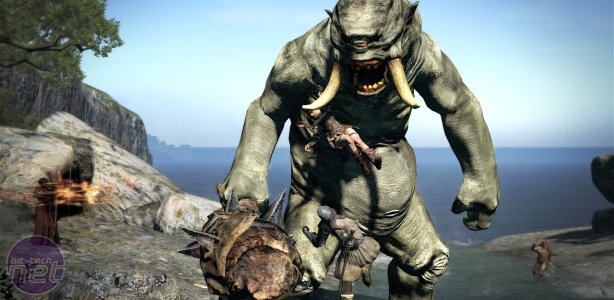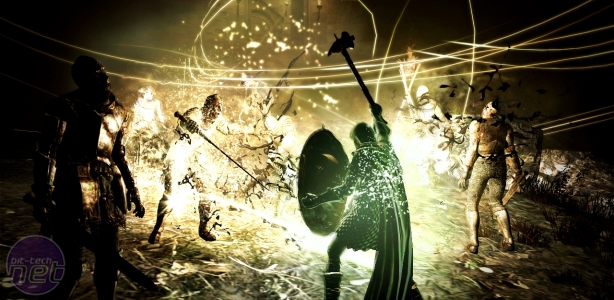
When other players recruit your Pawn it learns from its experiences, reporting its findings back to you. Likewise, if, for example, you’re having a hard time with a boss and the Pawn you’ve recruited has beaten it before with another player, he’ll shout out advice of what to do. Pawns even get to keep the loot they acquire, making waking up in inns like a weird Christmas, with Pawns playing at Santa, delivering herbs and potions instead of socks and chocolates. A simple, yet brilliantly executed idea that’s seamlessly integrated into the game.
Sadly, the world of Gransys isn’t particularly exciting to explore in a traditional RPG sense. The towns feel semi-deserted and the people who do inhabit them rarely have anything to say, the story is threadbare (though does pick up for the last few hours before having one of the most bizarre endings we’ve seen in ages) and side quests are mostly fetch quests and kill x amount of a particular monster type affairs.
In Dragon’s Dogma the wilderness is most definitely where it’s at. Visually it’s nothing to shout about, with a dull palette of greens, greys and browns and only the odd sunset adding variety of colour. But the feeling of trekking through unknown territory has a palpable sense of trepidation and exploration that, again, feels more akin to Dark Souls than other modern RPGs.
With only one save slot available per game, you move with caution, not wanting to save too often in case you get caught in a deadly situation. The main reason the wilderness rules is because that’s where the majority of fights take place. Developed by some of the team who worked on Devil May Cry the combat in Dragon’s Dogma is leagues above most action RPGs, though still not perfect. There’s no lock-on, so targeting can be fiddly, and timing lacks the finesse of a dedicated fighter, but overall it’s a solid system. Combos [of sorts] can be strung together and enemies can be juggled in the air, and even be picked up and thrown if small, or climbed onto if big.
There’s a large selection of special moves/spells to choose from depending on level and class and up to six can be assigned at any one time. When combined with the rest of your party’s move set there’s an impressive amount of ways to approach enemy encounters. Items can also be used in interesting ways, for example, if you chuck a flask of water over a monster then cast an ice spell it will be frozen solid, or if you chuck oil over one then set it on fire, it will burn for longer.
Unfortunately, combat does hinge quite a lot on your Pawns acting sensibly and occasionally they will do ridiculous things such as momentarily forgetting the concept of avoiding things that will kill them. Our main Pawn, for instance, had a habit of running up to enemies even though he only had ranged attacks at his disposal. Silly Pawn.
Dragon’s Dogma has been unfairly billed as Capcom’s attempt to emulate Western RPGs. Though it strays from traditional JRPG elements and does have one of the most uninspired fantasy settings ever, its gameplay offers a unique experience in a crowded genre, owing little to the likes of Skyrim, Kingdoms of Amalur and Dragon Age.
Highlights are the interesting integration of online features (one section of the game can even be played co-operatively, though we couldn’t find any players pre-release), its dynamic combat, challenging difficulty level and a party system that encourages experimentation. There are downsides, such as the plain graphics, temperamental AI and lack of characters to really care about, but for those wanting an RPG with the emphasis firmly on action; Dragon’s Dogma is certainly worth checking out.
Sadly, the world of Gransys isn’t particularly exciting to explore in a traditional RPG sense. The towns feel semi-deserted and the people who do inhabit them rarely have anything to say, the story is threadbare (though does pick up for the last few hours before having one of the most bizarre endings we’ve seen in ages) and side quests are mostly fetch quests and kill x amount of a particular monster type affairs.
In Dragon’s Dogma the wilderness is most definitely where it’s at. Visually it’s nothing to shout about, with a dull palette of greens, greys and browns and only the odd sunset adding variety of colour. But the feeling of trekking through unknown territory has a palpable sense of trepidation and exploration that, again, feels more akin to Dark Souls than other modern RPGs.
With only one save slot available per game, you move with caution, not wanting to save too often in case you get caught in a deadly situation. The main reason the wilderness rules is because that’s where the majority of fights take place. Developed by some of the team who worked on Devil May Cry the combat in Dragon’s Dogma is leagues above most action RPGs, though still not perfect. There’s no lock-on, so targeting can be fiddly, and timing lacks the finesse of a dedicated fighter, but overall it’s a solid system. Combos [of sorts] can be strung together and enemies can be juggled in the air, and even be picked up and thrown if small, or climbed onto if big.
There’s a large selection of special moves/spells to choose from depending on level and class and up to six can be assigned at any one time. When combined with the rest of your party’s move set there’s an impressive amount of ways to approach enemy encounters. Items can also be used in interesting ways, for example, if you chuck a flask of water over a monster then cast an ice spell it will be frozen solid, or if you chuck oil over one then set it on fire, it will burn for longer.
Unfortunately, combat does hinge quite a lot on your Pawns acting sensibly and occasionally they will do ridiculous things such as momentarily forgetting the concept of avoiding things that will kill them. Our main Pawn, for instance, had a habit of running up to enemies even though he only had ranged attacks at his disposal. Silly Pawn.
Dragon’s Dogma has been unfairly billed as Capcom’s attempt to emulate Western RPGs. Though it strays from traditional JRPG elements and does have one of the most uninspired fantasy settings ever, its gameplay offers a unique experience in a crowded genre, owing little to the likes of Skyrim, Kingdoms of Amalur and Dragon Age.
Highlights are the interesting integration of online features (one section of the game can even be played co-operatively, though we couldn’t find any players pre-release), its dynamic combat, challenging difficulty level and a party system that encourages experimentation. There are downsides, such as the plain graphics, temperamental AI and lack of characters to really care about, but for those wanting an RPG with the emphasis firmly on action; Dragon’s Dogma is certainly worth checking out.
-
Overall70 / 100


MSI MPG Velox 100R Chassis Review
October 14 2021 | 15:04











Want to comment? Please log in.